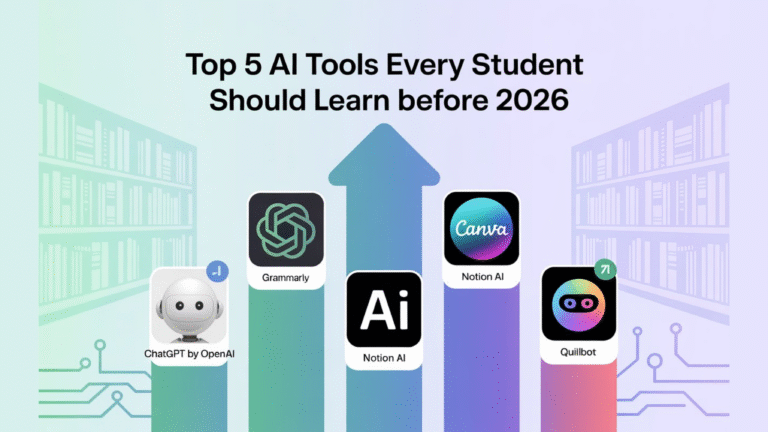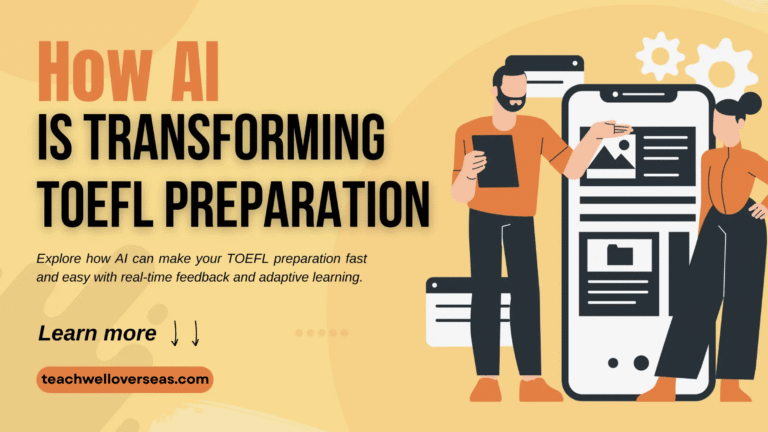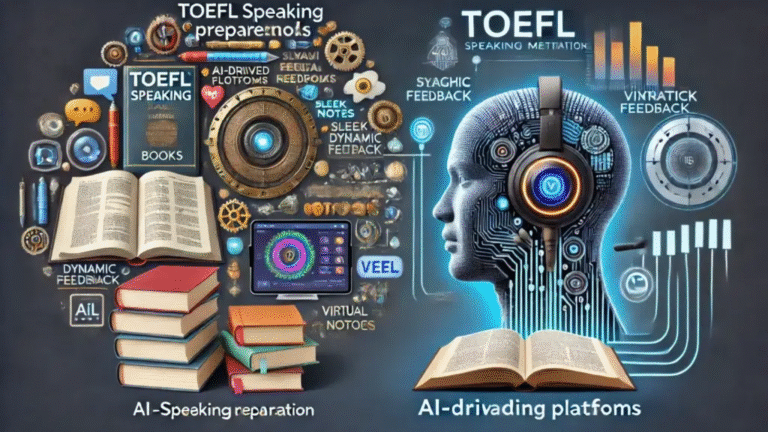Discover more smart AI Tools and TOEFL tips to enhance your preparation and achieve your dream score abroad!
Study Abroad Consultants In Delhi
AI Tools That Can Boost Your TOEFL Preparation (2026 Edition)
Technology has modernized how students prepare for their academic exams in today’s society, and the TOEFL (Test of English as a Foreign Language) test is no different. As institutions of higher education worldwide continue to have English proficiency as an admissions priority, candidates are in constant search of smarter, faster, and better ways to prepare.
This is where the use of AI Tools can be beneficial. AI Tools, or Artificial Intelligence Tools, improve the personalization of preparedness for the TOEFL. While allowing students to save time, have insight into their progress, and prepare for mastering each of the four parts sections of the TOEFL exam, including reading, listening, speaking and writing.
In this guide, we are going to discuss how AI Tools can change TOEFL preparation, and identify some of the best apps currently available, Create a plan for using them efficiently to optimize your score potential, whether you have just begun the TOEFL preparation process or you’re preparing your final weeks of practice. AI prep can be a game-changer.

The Role of AI Tools in Modern TOEFL Preparation
Test prep has been revolutionized by Artificial Intelligence through new adaptive and cognitive learning systems. Instead of the same order in study prep for all students as in the basic learning systems, AI Tools learn your pace, style, and weaknesses.
When you respond incorrectly on a question, AI will not just mark it incorrect, but also evaluate your mistakes. Were you confused by vocabulary? Did you have a gap in comprehension? Did you manage your time poorly? Based on that analysis, AI will tailor quizzes to prompt your studies, assign individualized activities, and develop your progression of skills over time.
In terms of TOEFL prep, this means you are using time more responsibly. AI can track patterns in your responses and focus your study just on your weaker areas while still maintaining strengths. This sort of feedback is just the sort of individualized experience that students need to achieve at their highest potential in a competitive world.
Why Students Are Switching to AI Tools for TOEFL Prep
As of 2026, there are practically essential tools used in preparing competitive tests. AI Tools (those using Artificial Intelligence), given their versatility, accessibility and accuracy. Here are some of the reasons that students throughout the world – especially TOEFL students – are making use of AI based platforms:
1. Personalized Learning Experience
Everyone learns differently. Platforms powered by AI, like Magoosh AI Prep or TestGlider, can assess your level in real time and change the difficulty of practice questions accordingly. This provides a fully individualized learning experience — one that can be difficult for even experienced tutors to construct.
2. Real-Time Feedback on Performance
AI studying tools are not like the usual practice books that only give you answers. They provide immediate feedback about your answers. While working on the writing portion, if your essay has the same sentence structures or has a grammar error. Writeful and Grammarly will identify these problems on the spot and offer improvements.
3. Enhanced Pronunciation and Fluency Training
One of the biggest difficulties in the speaking section of the TOEFL is pronunciation. AI speech recognition programs such as ELSA Speak and Speechify AI Voice Coach will analyze your accent, tone, and intonation and provide customized pronunciation score and suggestions.
4. Improved Time Management
AI-based pacing tools, such as TestGlider or PrepAI, keep track of how long you spend on each question and provide feedback about your pacing. This will help you complete sections of the exam before time is up, which is very important for the TOEFL test day!
5. 24/7 Accessibility and Adaptability
You won’t need to rely on the schedules of coaching classes any longer. With AI Tools, you are free to study at your own pace anywhere, anytime. It allows you to practice your essay writing at 12:00 PM (or practice your listening skills at 5:00 AM), as AI allows you to study according to your timetable.

How AI Tools Strengthen Each TOEFL Section
Each section of the TOEFL requires specific skills, and AI Tools target these areas with surgical precision. Let’s break down how they work across all four sections.
1. Reading Section: Smarter Comprehension with AI Assistance
The TOEFL reading section assesses your proficiency in understanding college-level reading passages. Powered by AI technologies such as ChatGPT-5, Rewordify, and ReadTheory AI, these platforms evaluate your comprehension ability and assist you in finding academic passages targeting the areas you require practice.
They function to improve vocabulary recognition, contextual understanding, and critical reasoning, all while helping to establish improvement metrics. Some AI Tools can even provide tailor-made reading passages, based on your subjects of interests (i.e., engineering, business, etc.), to make your practice more enjoyable!
For example, if you struggle on inference questions, the AIs will generate more inference questions until you demonstrate improvement and consistency.
2. Listening Section: AI Tools for Active Audio Learning
Listening comprehension is another difficult section of the TOEFL exam, especially for people who are not native English speakers. AI-assisted tools like Speechify, YouGlish, and BBC Learning AI Audio Trainer expose learners to several accents (British, American, and Australian) and utilize tests and quizzes to evaluate comprehension.
These sites use adaptive sound-based learning, where learners whom you respond accurately the sound chunks increase in complexity. Some sites even offer controls for the speed of the audio sound words and keywords options that help learners get used to the natural pace.
Pro Tip: Use AI listening tools in conjunction with transcript reading and listening human advantages to help focus on the composition too; what a speaker says (content), and how they say it (intonation, tone, and rhythm).
3. Speaking Section: Perfect Pronunciation and Fluency with AI Tools
The speaking section is often considered to be the most challenging section of the TOEFL; however, utilizing AI Tools is now making practice for this section much easier. Because of applications like ELSA Speak, TalkPal, and Speechify Voice AI, students can now mimic a real speaking test.
The tools apply Natural Language Processing (NLP) and speech recognition technology to provide feedback on their students’ pronunciation, fluency, grammar, and coherence. These tools offer real-time feedback that highlights any mispronounced words and suggests the appropriate sounds.
Moreover, there are advanced AI speaking assistants that generate mock TOEFL speaking prompts, and, after students respond, accurately assess the student responses against the official scoring rubric.
Example: When you describe an image or respond to a task prompt, the AI system gives you a “fluency score,” helps you correct your rhythm, and accurately evaluates the use of transition phrases and when and how to use them naturally.
4. Writing Section: Refine Your Essays Using AI Writing Assistants
In TOEFL writing, clarity and coherence are very important. AI-powered tools such as Writeful, Grammarly Premium, Linguix, and Slick Write can be used by students to polish essays for grammatical, structural, and vocabulary issues.
Writeful, in particular, is tailored to academic writing, and is an excellent option for higher level TOEFL students because it mimics the requirements of a TOEFL assessment. Writeful follows along with your writing for your essay and checks for word variety, sentence complexity and even evaluates appropriateness of pacing or tone within your writing.
Simultaneously, using something like ChatGPT-5 to be your imaginative partner is an option to generate multiple outlines or arguments for essays, to suggest thesis statements or even to provide model responses for common TOEFL topics.
Pro Tip to avoid pitfalls, is to use AI Tools as a guide, and never as a ghostwriter. Always write your essay independently first and then use AI for feedback and improvement.

Top AI Tools to Use for TOEFL Preparation in 2026
Here are some of the best and useful AI Tools for 2026 that will help you increase your chances of success on the TOEFL:
ChatGPT-5 will help with essay drafting, reading comprehension, and vocabulary.
ELSA Speak is the best for practice and improving your pronunciation for the speaking section.
Writeful is ideal to improve academic writing.
Grammarly Premium is best for checking grammar, improving vocabulary, and writing tone.
TestGlider is a test for a simulated TOEFL test with AI scoring and analytics.
Speechify AI – For listening comprehension and becoming used to an accent.
Duolingo AI English Practice – Practice vocabulary and sentence formation.
YouGlish – To hear a native pronunciation of the word through real- video examples.
All of these tools together can provide a complete preparation ecosystem and prepare study for all four areas of the test with confidence.
Combining AI Tools with Traditional Preparation Methods
While AI Tools are excellent independently, their potential is maximized when they are used in conjunction with traditional study methods. Study TOEFL preparation books for the theory, then take an online class for the structure, and finally use AI for practice, evaluation, and revision.
For example, once you engage with the writing section of The Official Guide to TOEFL, you can paste your essay into Grammarly or Writeful for immediate feedback. After completing a set of mock speaking tasks, you may use ELSA Speak to assess pronunciation.
This combination offers the promise of individualised study associated with AI Tools, while important insight from teachers sets the boundaries of study to the worldly outcomes.
Explore top-rated AI Tools for TOEFL prep on global platforms and stay ahead in your 2026 study abroad journey!
Common Mistakes Students Make While Using AI Tools
AI Tools make preparing for the TOEFL easier, but improper use may decrease their effectiveness. Here are common mistakes to avoid:
Relying solely on AI-generated answers. Students occasionally ask an AI to write an essay or answer a question for them, and they forget the learning opportunity that this exercise represents.
Disregarding manual review- AI can help clarify ideas, but it’s important to think about the concept yourself.
Not reviewing corrections- Review feedback and corrections provided by an AI carefully. You should not just accept or implement the correction; you should ask yourself about the rationale for it.
Using too many platforms simultaneously- If you use multiple applications simultaneously, you risk being overwhelmed by usability and with unclear direction. Focus on using 2-3 platforms that you trust.
Future Trends: AI Tools and TOEFL Preparation Beyond 2026
The transformation of AI tools for education won’t be slowing down any time soon. In a few years, we expect features like emotional tone correction, real-time conversation partners, and adaptive study schedules based on brain fatigue will be available for AI learning assistants.
Students may have personalized “AI tutors” built into their smart devices, providing live TOEFL simulations with instant analytical reports.
Also, numerous universities and EdTech companies are building integrated learning ecosystems — where TOEFL prep, college application support, and career counseling are all integrated with the use of AI.
The reality is that the smarter you are with technology, the better your outcomes.

FAQs on AI Tools for TOEFL Preparation (2026 Edition)
Are AI Tools accurate for TOEFL scoring?
Yes, modern AI platforms like TestGlider use machine learning models trained on actual TOEFL responses, giving near-accurate predictive scores.
Can AI Tools replace personal tutors?
Not completely. While AI offers unmatched feedback and adaptability, human tutors provide emotional guidance and deeper conceptual explanations.
Are AI Tools safe to use for exam preparation?
Yes. Most established platforms follow strict privacy policies. Always use official or verified tools to ensure data safety.
How much do premium AI Tools cost?
Most have free versions, while premium subscriptions (₹500–₹2000 per month) unlock advanced analytics and real-time speaking evaluations.
Which AI Tool is best for beginners?
Start with Duolingo AI and Grammarly for foundational skills, then move to ELSA Speak or TestGlider for more advanced practice.
Conclusion: Embracing AI for Smarter TOEFL Success
The 2026 TOEFL system will be founded on efficiency, flexibility, and innovation — and that’s exactly what AI Tools provide. They will make preparation more immersive and analytical and, ultimately, more fun while maximizing your time spent studying and learning.
Whether it’s using Writeful to refine your essay writing skills, ELSA to improve your pronunciation, or TestGlider to assess your performance, AI technology will help you attain constructive accuracy in less time and with greater confidence.
The future of TOEFL preparation is through the best of intelligent technology with the consistency of human effort. The test-takers who leverage AI-based study protocols today will not only achieve higher scores but also build lifelong language skills geared for a global education experience.
